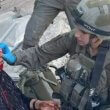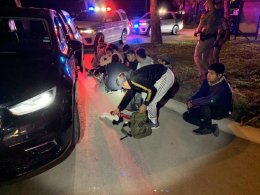Russia’s continued assault on its neighbor Ukraine sheds light on the evolving state of warfare, offering insights the U.S. can use to inform its own defense posture, according to the director of the Pentagon’s Joint Artificial Intelligence Center.
“To me, it’s just striking,” Lt. Gen. Michael Groen said at the C4ISRNET Conference, adding that were this situation viewed through the standard Cold War lens, “you’d look at massive steel and massive firepower. Now, you can see the impact of precision capabilities, the information environment.”
“You can see the shadows of a change in the nature, or at least in the application, of warfare here in this information age,” he said April 20.
Russian forces, though better-equipped and specialized, have been stymied by an entrenched Ukrainian military, Western arms and logistical collapse. Russian President Vladimir Putin’s hope of squashing an outgunned opponent and quickly seizing key areas has fizzled. The invasion will soon enter its third month.
President Joe Biden described Ukraine’s bloody win in Kyiv, its own capital region, as “a historic victory.”
“You must be amazed at the courage of this country, the resolve that they’re showing,” he said during a White House speech on April 21. “Not just their military, but the average citizen, men and women, young men, young women, as well.”
Questions that need asking and topics that need addressing across the U.S. Department of Defense, Groen said, include “the transformation of the character of warfare in an information age” and what that means for capabilities being developed or gear that is purchased.
“Do large objects — maybe they got lots of steel, maybe they throw lots of metal at the enemy. Is that better? I mean, that’s what we’re used to,” the director said. “Is that the capability that’s going to make us successful in tomorrow’s fight?”
Both the U.S. and Russia have funded and pursued cutting-edge tech, like AI for fighting purposes, and have armed themselves with impressive digital arsenals. Groen acknowledged that Wednesday: “The competition is what drives us.”
Where Russia has fallen short is fundamental coordination, a failure to ingrain information sharing in “the core of its operational concepts and into its command-and-control architecture,” according to Chris Dougherty, a senior fellow for the defense program at the Center for a New American Security.
“You know, the Russians have a lot of weaponry. It’s still pretty good. And by any reasonable metric, they vastly outnumber and outclass the Ukrainians in most ways, but they can’t bring it to bear because they can’t share information with each other and trust each other,” Dougherty said at the virtual conference. “And I think that is the key here, when we’re looking at what’s the lesson learned. We’ve got to be able to share information with each other. We’ve got to trust each other, and we’ve got to trust in the information that we’re sharing.”
Groen said he is eager to learn lessons and glean information to give the Defense Department and the U.S., broadly, an advantage, especially against an informed, large-scale foe.
“I guess if you ask the Russians right now, should you buy more tanks or should you buy precision munitions and the information environment that allows you to apply those effectively, the Russians might give you a different answer today than they would have given you two months ago,” Groen said.










